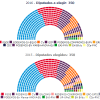(*) Published on 23/6/2016 in EUforum (Clingendael).
The EU integration process is at the core of the Spanish national project
Absence from the European core when the European Communities were created and political/economic backwardness (which can be to some extent traced back to the 19th century) is the root cause of a deeply dominant idea among elites that ‘Spain was a problem and Europe its solution’.
“The country was still profoundly pro-European when the Eurozone crisis erupted”
Since Spain’s return to democracy in 1976-78, the European integration process has gone hand in hand with the national project itself. Europeanisation has been the main internal strategy for anchoring democracy, modernising the economy and society, normalising foreign policy and converging with the most advanced western European countries.
When Spain finally joined the EU in 1986 this vision was widely shared by citizens. A strong pro-European consensus has existed in both public opinion and across the political spectrum (from communists to conservatives, also including peripheral nationalists in Catalonia and the Basque Country). It is true that a series of events may have led to ‘de-europeanise’ Spain after 2000, with some loss of influence in Brussels as a result, but the country was still profoundly pro-European when the Eurozone crisis erupted.
Support for the EU declines but still (relatively) strong
The crisis showed politicians and public opinion that Europe really mattered (and not always in the most positive sense) and how damaging it could be to fail to occupy a pivotal position within the EU. Since 2010 economic and political weaknesses have led Spaniards to end their permissive consensus regarding Europe, with a significant impact on the traditional Spanish narrative of the supranational project.
For the first time, the EU came to be seen not as an aid to a better democracy but rather as a means of disempowerment; furthermore, the EU was blamed for both austerity and internal devaluation and not seen as an instrument to provide greater prosperity and security; finally, the EU as part of the national project was also penalised by the northern stereotypes regarding peripheral and debtor countries.
“Examples of recent EU proactiveness remain limited”
Hence, a decline in support for the EU has been clear over the past few years, particularly during the toughest periods of the crisis (according to the Eurobarometer, 72% of the population tended not to trust the EU as an institution in May 2012; in May 2007 only 23% tended not to trust it). Nevertheless, recent opinion polls are showing a recovery or, at least, an underlying Europeanism which is stronger among centre-left and right-wing voters than in the left (a trend particularly visible in the Spring 2016 Global Attitudes Survey “Euroskepticism Beyond Brexit”, conducted by the Pew Research Center).
The latest Eurobarometer (Autumn 2015) shows that Spaniards feel they are citizens of the EU (75%) and are mostly in favour of the Euro (67%), a common European policy on migration (81%) and a common energy policy among EU member states (78%). And, according to a poll published in May 2016 (Ipsos MORI), 48% of Spaniards think that more Europe should be the long-term policy of Spain, a figure somewhat higher than in Germany, Italy and France (not to mention the UK).
However, the traditional distinguishing pro-European attitude of Spain can no longer be taken for granted. In the same Ipsos MORI poll, 40% of Spaniards think their own country should hold a referendum on EU membership and 26% of the sample said they would vote ‘exit’ if such a referendum were to be held now. For its part, the aforementioned 2016 Pew poll shows that only 47% of Spaniards have a favourable view of the EU in Spain (49% unfavourable).
And it is worth mentioning here the fast emergence of a new leftist coalition around the left-wing political party Podemos (with around 25% of popular support), which is not openly Eurosceptic, although it is very much against austerity and some other crucial developments in EU policy such as the TTIP negotiations and the EU’s handling of the refugee crisis. Its position reflects the changes in public opinion that challenge the traditional permissive consensus.
Still in search for a more proactive and less reactive attitude
The European Project lacks a clear roadmap. The general feeling in Spain is that nobody knows what to do, apart from Europhobes. Spain, despite the federal approach of its elites (the new Spanish Strategy for External Action even speaks about the ‘United States of Europe’), shows a relatively reactive attitude towards the European project.
During the 1990s Spain played an important role shaping European policies, including the establishment of cohesion funds, the creation of EU citizenship, counter-terrorism cooperation and the uploading of some geographical priorities (Southern Mediterranean or, to a lesser extent, Latin America) to the external EU agenda. But examples of recent proactiveness, although limited, also exist: Spain’s 2015 report on how to improve the EU’s economic governance was far more ambitious than the Five Presidents’ Report, done by the EU institutions.
Spaniards do not fool themselves and state (50% of them) that their country plays a less important role in the world compared to 10 years ago, according to the latest poll by the Pew Research Center. However, they also show committed Europeanism by thinking Spain should help other member states to deal with their problems (55%, the highest figure among the countries included in the poll), and they are unambiguously in favour (90% supportive while only 6% against) of an EU with a bigger role in world affairs. All of this shows that in Spain there is still room for having a more leading attitude in the European project.
Salvador Llaudes
Analyst, Real Instituto Elcano | @sllaudes
Ignacio Molina
Senior Analyst for Europe, Elcano Royal Institute | @_ignaciomolina

